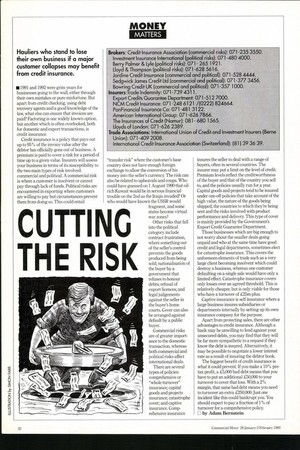CUTTIN THE RISK
Page 34

If you've noticed an error in this article please click here to report it so we can fix it.
Hauliers who stand to lose their own business if a major customer collapses may benefit from credit insurance.
• 1991 and 1992 were grim years for businesses going to the wall, either through their own mistakes or pure misfortune. But apart from credit checking, using debt recovery agents and a good knowledge of the law, what else can ensure that invoices are paid? Factoring is one widely known option, but another which is often overlooked, both for domestic and export transactions, is credit insurance.
Credit insurance is a policy that pays out up to 95% of the invoice value after the debtor has officially gone out of business. A premium is paid to cover a risk for a period of time up to a given value. Insurers will assess your business in terms of its susceptibility to the two main types of risk involved: commercial and political. A commercial risk is where a customer is insolvent or cannot pay through lack of funds. Political risks are encountered in exporting where customers are willing to pay but circumstances prevent them from doing so. This could entail "transfer risk" where the customer's base country does not have enough foreign exchange to allow the conversion of his money into the seller's currency. The risk can also be related to upheavals and coups. Who could have guessed on 1 August 1990 that oilrich Kuwait would be in serious financial trouble on the 2nd as the Iraqis invaded? Or who would have known the USSR would fragment, and some states become virtual war zones?
Other risks that fall into the political category include contract frustration, where something out of the seller's control prevents the goods produced from being sold; nationalisation of the buyer by a government that refuses to honour debts; refusal of export licences; and legal judgements against the seller in the buyer's home courts. Cover can also be arranged against default by a public buyer.
Commercial risks are of greater importance to the domestic transaction, whereas both commercial and political risks affect international deals.
There are several types of policies: comprehensive or "whole turnover" insurance; capital goods and projects insurance; catastrophe cover; and captive insurance. Comprehensive insurance insures the seller to deal with a range of buyers, often in several countries. The insurer may put a limit on the level of credit. Premium levels reflect the creditworthiness of the buyer and that of the country you sell to, and the policies usually run for a year. Capital goods and projects tend to be insured under one-off policies that take account of the high value, the nature of the goods being shipped, the countries to which they're being sent and the risks involved with product performance and delivery This type of cover is mainly provided by the Government's Export Credit Guarantee Department.
Those businesses which are big enough to not worry about the smaller deals going unpaid and who at the same time have good credit and legal departments, sometimes elect for catastrophe insurance. This covers the unforeseen elements of trade such as a very large client becoming insolvent which could destroy a business, whereas one customer defaulting on a single sale would have only a limited effect Catastrophe insurance covers only losses over an agreed threshold. This is relatively cheaper, but is only viable for those who have a turnover of £25m-plus.
Captive insurance is self insurance where a large business insures subsidiaries or departments internally by setting up its own insurance company for the purpose.
Apart from protecting sales, there are other advantages to credit insurance. Although a bank may be unwilling to lend against your unsecured dPhts, you may find that they will be far more sympathetic to a request if they know the debt is insured. Alternatively, it may be possible to negotiate a lower interest rate as a result of insuring the debtor book.
The biggest benefit of credit insurance is what it could prevent. If you make a 10% pretax profit, a £5,000 bad debt means that you have to put an additional £50,000 to your turnover to cover that loss. With a 2% margin, that same bad debt means you need to turnover an extra £250,000. Just one incident like this could bankrupt you. You should expect to pay a fraction of 1% of turnover for a comprehensive policy. D by Adam Bernstein Brokers: Credit Insurance Association (commercial risks): 071-235 3550.
Investment Insurance International (political risks): 071-480 4000.
Berry Palmer & Lyle (political risks): 071265 1921.
Lloyd & Thompson (political risks): 071-628 5616.
Jardine Credit Insurance (commercial and political): 071-528 4444.
Sedgwick James Credit Ltd (commercial and political): 071-377 3456.
Bowring Credit UK (commercial and political): 071-357 1000.
Insurers:Trade Indemnity: 071-739 4311.
Export Credits Guarantee Department: 071-512 7000.
NCM Credit Insurance: 071-248 6121 /(0222) 824664.
PanFinancial Insurance Co: 071-481 3122.
American International Group: 071-626 7866.
The Insurances of Credit (Namur): 081680 1565.
Lloyds of London: 071-626 2389.
Trade Associations: International Union of Credit and Investment Insurers (Berne Union): 071-409 2008.
International Credit Insurance Association (Switzerland): (81) 39 36 39.






















































































